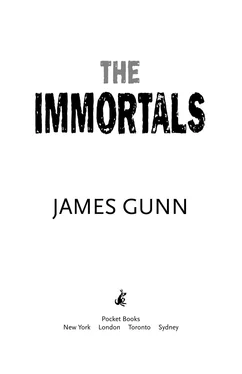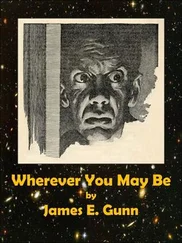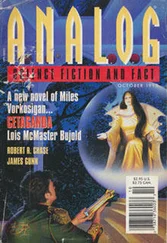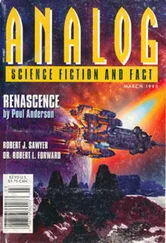After the outriders came an ambulance, its armored ports closed, its automatic 40-millimeter gun roaming restlessly for a target. More outriders covered the rear. Above the convoy a helicopter swooped low.
Something glinted in the sunlight, became a line of small round objects beneath the helicopter, dropping in an arc toward the street. One after another they broke with fragile, popping sounds. They strung up through the convoy.
Like puppets when the puppeteer has released the strings, the outriders toppled to the street, skidding limply as their motorcycles slowed and stopped on their single wheels.
The ambulance could not stop. It rolled over one of the fallen outriders and crashed into a motorcycle, bulldozing it out of the way. The 40-millimeter gun jerked erratically to fix its radar sight on the helicopter, but the plane was skimming the rooftops. Before the gun could get the range the plane was gone.
Harry smelled something sharply penetrating. His head felt swollen and light. The street tilted and then straightened.
In the midst of the crowd beyond the ambulance an arm swung up. Something dark sailed through the air and smashed against the top of the ambulance. Flames splashed across it. They dripped down the sides, ran into gun slits and observation ports, were drawn into the air intake.
A moment followed in which nothing happened. The scene was like a frozen tableau—the ambulance and the motorcycles balanced in the street, the outriders and some of the nearest citizens crumpled and twisted on the pavement, the citizens watching, the flames licking up toward greasy, black smoke…
The side door of the ambulance fell open. A medic staggered out, clutching something in one hand, beating at flames on his white jacket with the other.
The citizens watched silently, not moving to help or hinder. From among them stepped a dark-haired man. His hand went up. It held something limp and dark. The hand came down against the medic’s head.
No sound came to Harry over the roar of the idling motorcycles and ambulance. The pantomime continued, and he was part of the frozen audience as the medic fell and the man stooped, patted out the flames with his bare hands, picked the object out of the medic’s hand, and looked at the ambulance door.
A girl stood there, Harry noticed. From this distance Harry could tell little more than that she was dark-haired and slender.
The flames on the ambulance had burned themselves out. The girl remained in the doorway, not moving. The man beside the fallen medic looked at her, started to hold out a hand, stopped, let it drop, turned, and faded back into the crowd.
Less than two minutes had passed since the sirens began.
Silently the citizens pressed forward. The girl turned and went back into the ambulance. The citizens stripped the outriders of their clothing and weapons, looted the ambulance of its black bag and medical supplies, picked up their fallen fellows, and disappeared.
It was like magic. One moment the street was full of them. The next moment they were gone. The street was empty of life.
Behind the Medical Center walls the sirens began again.
It was like the release from a spell. Harry began running down the street, his throat swelling with shouts. There were no words to them.
Out of the ambulance came a young boy. He was slim and small—no more than seven years old. He had blond hair, cut very short, and dark eyes in a tanned face. He wore a ragged T-shirt that once might have been white and a pair of blue jeans cut off above the knees.
He reached an arm back into the ambulance. A yellowed claw came out to meet it, and then an arm. The arm was a gnarled stick encircled with ropy blue veins like lianas. It was attached to a man on stiff, stiltlike legs. He was very old. His hair was thin, white silk. His scalp and face were wrinkled parchment. A tattered tunic fell from bony shoulders, around his permanently bent back, and was caught in folds around his loins.
The boy led the old man slowly and carefully into the ruined street, because the man was blind, his eyelids flat and dark over empty sockets. The old man bent painfully over the fallen medic. His fingers explored the medic’s skull. Then he moved to the outrider who had been run over by the ambulance. The man’s chest was crushed; a pink froth edged his lips as punctured lungs gasped for breath.
He was as good as dead. Medical science could do nothing for injuries that severe, that extensive.
Harry reached the old man, seized him by one bony shoulder. “What do you think you’re doing?” he asked.
The old man didn’t move. He held to the outrider’s hand for a moment and then creaked to his feet. “Healing,” he answered in a voice like the whisper of sandpaper.
“That man’s dying,” Harry said.
“So are we all,” said the old man.
Harry glanced down at the outrider. Was he breathing more easily, or was that illusion?
The stretcher bearers reached them.
* * *
Harry had a difficult time finding the dean’s office. The Medical Center covered hundreds of city blocks, and it had grown under a strange stimulus of its own. No one had ever planned for it to be so big, but it had sprouted an arm here when demand for medical care and research outgrew the space available, a wing there, and arteries through and under and around…
He followed the glowing guidestick through the unmarked corridors, and tried to remember the way. But it was useless. He inserted the stick into the lock on an armored door. The door swallowed the stick and opened. As soon as Harry had entered, the door swung shut and locked. He was in a bare anteroom. On a metal bench bolted to the floor along one wall sat the boy and the old man from the ambulance. The boy looked up at Harry curiously, and then his gaze returned to his folded hands. The old man rested against the wall.
A little farther along the bench was a girl. She looked like the girl who had stood in the doorway of the ambulance, but she was smaller than he had thought and younger. Her face was pale. Only her blue eyes were vivid as they looked at him with a curious appeal and then faded. His gaze dropped to her figure; it was boyish and unformed, clad in a simple brown dress belted at the waist. She was no more than twelve or thirteen years old, he thought.
The reception box had to repeat the question twice: “Name?”
“Doctor Harry Elliott,” he said.
“Advance for confirmation.”
He went to the wall beside the far door and put his right hand against the plate set into it. A light flashed into his right eye, comparing retinal patterns.
“Deposit all metal objects in the receptacle,” the box said.
Harry hesitated and then pulled his stethoscope out of his jacket pocket, removed his watch, emptied his trouser pockets of coins and pocketknife and hypospray.
Something clicked. “Nose filters,” the box said.
Harry put those into the receptacle, too. The girl was watching him, but when he looked at her, her eyes moved away. The door opened. He went through the doorway. The door closed behind him.
Dean Mock’s office was a magnificent room, thirty feet long and twenty feet wide. It was decorated in mid-Victorian style. The furniture all looked like real antiques, especially the yellow-oak rolltop desk and the mahogany instrument cabinet.
The room looked rich and impressive. Personally, though, Harry preferred Twentieth Century Modern. Its clean chromium-and-glass lines were aesthetically pleasing; moreover, they were from the respectable early days of medical science—that period when mankind first began to realize that good health was not merely an accident, that it could be bought if men were willing to pay the price.
Harry had seen Dean Mock before but never to speak to. His parents couldn’t understand that. They thought he was the peer of everyone in the Medical Center because he was a doctor. He kept telling them how big the place was, how many people it contained: 75,000, 100,000—only the statisticians knew how many. It didn’t do any good; they still couldn’t understand. Harry had given up trying.
Читать дальше












